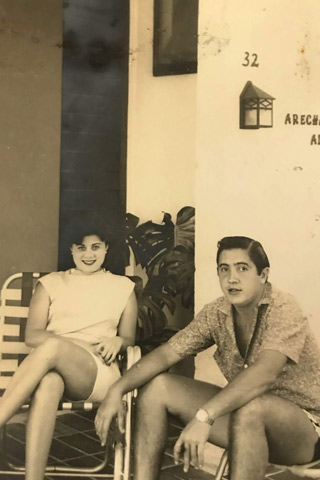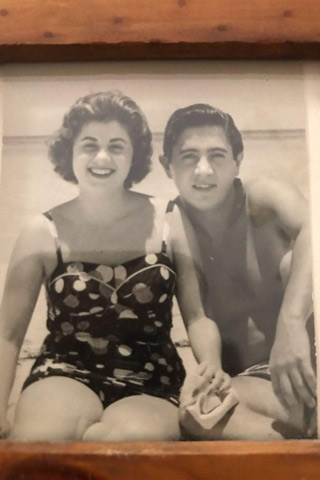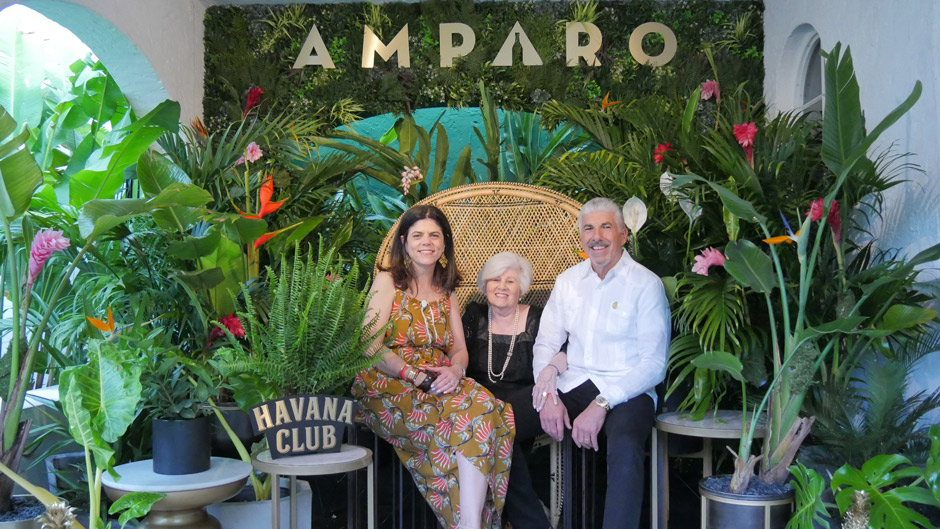It was a view of Cuba Amparo and Ramon Arechabala would never forget.
“I told Ramon to look outside the airplane window because we are never going to see this country again. That was my last recollection of my beloved country,” said Amparo Arechabala.
 The husband and wife were on board a flight packed with people fleeing Fidel Castro’s newly established Communist regime, just like them. Tears flowed and an overwhelming feeling of sorrow engulfed the exiles who were forced leave the life they knew in Cuba to start a new one with just the clothes on their back.
The husband and wife were on board a flight packed with people fleeing Fidel Castro’s newly established Communist regime, just like them. Tears flowed and an overwhelming feeling of sorrow engulfed the exiles who were forced leave the life they knew in Cuba to start a new one with just the clothes on their back.
“We didn’t decide to leave Cuba. It was decided for us by the Castro regime,” said Arechabala.
The Arechabala family, the founders of Havana Club rum, lost everything when guerilla soldiers stormed into their distillery in Cardenas, Cuba, and nationalized the family owned business they had worked so hard to build.
“They took Ramon and threw him in jail. They then gave him three choices. One, you can stay and work in the fields; two, we will release you from jail, but we’ll find another reason to arrest you; or three, leave Cuba,” said Arechabala.
The story of how the Arechabala family overcame hardships and struggles is history from there. The South Florida community has had the opportunity to “live” their unique story through an immersive theatrical play called “The Amparo Experience.” Throughout the play, audience members are taken through the journey of how the family was able to persevere and continue their legacy of rum making in the United States with the help of the Bacardi family. The sensational play, which was first scheduled for a limited two-month run, has now been in performance for more than six months due to overwhelming demand.
“My family thought it would just be a short show, but it kept getting sold out. The success really touches my heart in a way I can’t describe,” said Arechabala.
She credits the Miami community for helping her family get back on their feet when they first moved to the city in 1967. After leaving Cuba, Amparo and Ramon Arechabala moved first to Spain and then came to the United States, settling in Philadelphia before making the decision to move to Miami, where many of her family and friends lived.
 “We were very happy to be here with everyone we knew. I really felt like we belonged in this community. Miami helped us start again,” Arechabala said.
“We were very happy to be here with everyone we knew. I really felt like we belonged in this community. Miami helped us start again,” Arechabala said.
Once in Miami, Amparo was approached by a friend who offered her a job at the University of Miami Miller School of Medicine. Without any expectation, Amparo took the job. Little did she know the decision to work at the University would change her life forever.
“I started working at UM in 1967, and since then UM has always been in my heart. Nothing would have let me leave UM,” Arechabala recounted. “I am so grateful to UM. It greatly influenced my life. I am so proud to be part of such a great community.”
She began working at the Development office in the medical school, then later transitioned into the role of an assistant to the head of reproductive sciences and endocrinology laboratory. She remembers her time working there as being the “best years.” After more than 30 years serving the University community, Arechabala retired on Dec. 31, 2000, walking away with countless memories.
One of her favorite memories from her time working at the U is when she ran into a familiar face while delivering mail to the Coral Gables campus.
“I passed by the coffee machine in the Ashe Building and there was a person standing there who offered me a cup of coffee. Two weeks later I see a picture of the president of UM, Henry King Stanford, and I realized that was the man who made coffee for me. He was very nice,” she said.
During her time as a employee, she had the opportunity to watch two of her children graduate from the University. Miguel Arechabala graduated from the College of Engineering in 1981, and her daughter Paola graduated in 1987 with a psychology degree from the College of Arts and Sciences.
Amparo Arechabala hopes her family’s life story will live on through her children and grandchildren.
“I hope they are very proud of their heritage and what our family has accomplished. I want to remind my children and grandchildren of the freedom the U.S. brings to their lives,” she said.

